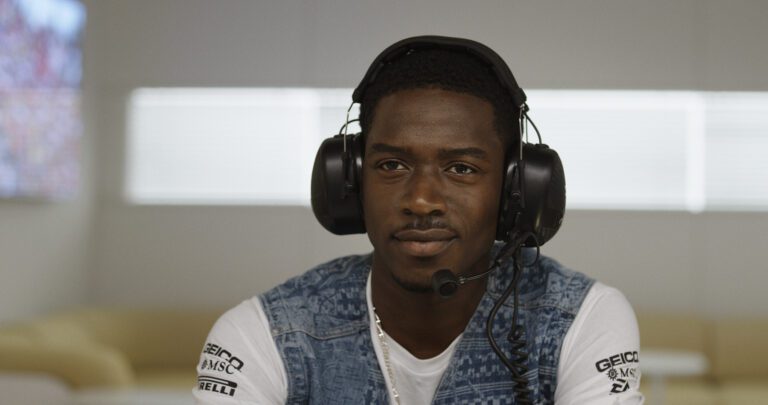It’s not often that you end up being a part of a cultural phenomenon. Matthew Maisto, however, knew Terrifier 3 was going to be huge and lobbied to be a part of it.
Maisto is not just the casting director for the sensation that is Terrifier 3, and it’s hardly the first time he’s worked with rising filmmakers. He has worked with S. Craig Zahler on his first two films, Bone Tomahawk and Brawl in Cell Block 99, director Kirsten Johnson on her buzzy documentary Dick Johnson Is Dead and the final two seasons of Issa Rae’s series Insecure, which earned him an Emmy nomination.
Maisto is also something of a rising star himself, and he took some time to chat with us from his home in New York.
Insights: Lessons from Matthew Maisto
- Gain experience from various casting directors to balance creative and business aspects.
- Treat the audition room like your stage and make a strong, creative impression.
- Reach out proactively to be part of projects you’re passionate about.
How did you get into casting?
I always think about that question. I got into the industry like many casting people do. I started on the other side of the table when I was a kid.
I grew up on Long Island, so I was close to one of the big markets. I grew up on Broadway shows, auditioning as a kid for commercials and TV shows and doing the normal paces that kids do, going to acting classes and doing shows at my school.
As a teenager, I always had this idea of wanting to cast my friends and my peers in the projects that I was involved with at school. I thought if I were in charge of casting this play or this musical, I would do it way better than the teachers could.
So you were into casting before you even knew what casting was?
That was always interesting to me, the competition aspect of it and the political part of how actors get roles.
I went to college in New York City at Marymount Manhattan College, and towards the end of that, I had the good fortune of working with a man named Andy Zerman, who was a big name in casting back in the 80s and 90s during the age of mega-musicals. He identified something in me that he thought would thrive in the casting world.
What do you think Zerman saw in you?
I don’t say this to pat myself on the back, but I think I have a really good sense of myself. I think it’s hard in this industry to separate yourself as an artist from the work you’re doing.
I was always able to sit in a room of actors and recognize that others were doing something better than I was. I think he noticed that I was able to identify my strengths, my weaknesses, and the fact that, when I would give feedback to other students, it came from a place of talking in the same capacity that a casting director would.
I always say that one of the things I love most about casting is it allows me to almost equally use my brain power in terms of the creative side of things and the business side of things.
That comes up a lot.
Yeah, and I don’t think I would be fulfilled as a person if my whole life was so creatively centered. I thrive when I get to marry the art and the commerce.
Through getting to know me, both as a student and as a friend, I think that he was able to pull certain things out of conversations with me that pointed to that.
What happened next?
I started working part-time at Central Casting in my junior year, to help them conduct open calls and fill their database with actors for background. I loved it so much, even though it wasn’t necessarily what I know casting to be now, casting principals and doing a more theatrical version of casting.
Background casting is a whole other ball of wax, but it was the first time I got to see the business side of things and see how all the departments in a film production or a TV production work together.
And that was it?
I designed my curriculum for my senior year so I could go to school at night and work in the office during the day. I liked it, but I realized I wanted something a little bit more creatively fulfilling, so I decided to start pursuing work with casting directors in New York City.
Luckily, Andy was able to help connect me with Mark Simon. I helped him cast the Broadway production of 13, which was my last taste of casting in the theater. I wanted to go and work in a casting office and have that be my full-time, long-term profession where I could grow and learn under kind of the tutelage of one casting director.
Did you hook up with another casting director? I know that’s how a lot of people get into it, coming up that way.
I worked freelance, which was a blessing in disguise because that allowed me to take bits and pieces of style taste, and business practice from different casting directors and craft my philosophy, rather than have it be informed in one place, which was nice.
I was very fortunate to work for casting directors like Ellen Lewis, Bernie Telsey, Marc Hirschfeld, Victoria Burrows and Scot Boland, Jeanne McCarthy, and then finally, I created a relationship with Victoria Thomas, and we started working on projects together both in Los Angeles and New York. That’s really when I found my home in casting.
What are some of the things that you learned that you took from them that you found would fit well in your practice of casting?
I started to become aware of designing my philosophy based on the good that I wanted to take from the people I came up under. Like the 80/20 Principle, the idea is that can we get the same results as someone who is doing 80% of their energy by only expending 20% of ours.
I know some casting directors who will see six to 10 people for a role that are highly curated from their lists and their understanding of actors and knowledge of actors, and one of them gets the role. Then I worked with another casting director, Jeff Greenberg, who would bring in a hundred actors to read for a small co-star role on Modern Family. He’d make his notes and then cut them down to a smaller group of people to come in for a callback.
That was the first time I’d worked with someone who did the work to find the best person. I was just fascinated by that. It was cool for me to see that true studio style of cattle calling actors in and finding an uncut gem.
I’m curious about your signing on to do something like Terrifier 3, a movie series that started from nothing, but has become a cult sensation, and entered the zeitgeist.
I love subversive modern and controversial work. I love things that start a conversation. I love independent film because I think it’s so much more interesting to see people working with the only tools they have in their toolbox and how they can create incredible stories that can go off and be impactful with that limited set of tools.
I was always a big fan of slasher films, and loved the first two movies. I called the director, Damien Leone, and said, “Hey, listen, I’ll pay you to cast this movie if you want.” (Laughs) I knew they needed someone who understood their way, but also someone who could educate them about all of the bureaucracy of working on a bigger budget independent film and help them stay true to their vision.
So there was a producorial aspect of you coming on board, too?
I don’t want to give myself that distinction as a producer, but there was certainly an advisory role attached to what I was doing. It’s just so fulfilling to me as a media consumer to be part of something I want to go and watch and buy a ticket for.
Aside from the casting stuff, I was able to be valuable to them, helping them marry their guerrilla filmmaking style with what would be expected of them working in this new arena.
You talk a lot about being in independent film, and with that comes working with auditioning a lot of new talent. Are there common mistakes that actors make when they come to audition for you?
The biggest mistake I see actors make, whether this is in an audition or an educational environment — I do a lot of teaching as well and coaching actors when I have time to do so — is this mentality that actors are coming into a testing situation.
I don’t ever want an actor to feel like they’re taking a test and have to get the right answer. I always try to free actors of that mindset and I think a little bit of it has gone away now since so much of what we’re doing is virtual, a lot of actors are self-taping.
With that in mind, what piece of advice or wisdom would you give to someone coming in to audition for you?
I want actors to come into an audition room and own that room for however many minutes they’re there. Take the space and use it as a place to put on a show and impress us a little bit. That’s your time in there. Also, a lot of times we don’t know what we’re looking for, and we’re looking for the actors to come in and inform that for us.
Ready to find your next role with Casting Networks? Sign up for a free trial today!
You may also like:
- How ‘Rez Ball’ Casting Directors Sande Alessi and Shayne Hartigan Work With Indigenous Communities to Build the Texture of Their Productions
- Ellen Jacoby Describes Her Wild Transition from Professional Backgammon to Casting and How the Florida Market Has Changed
- The Ultimate Guide to Audition Advice from Casting Directors













